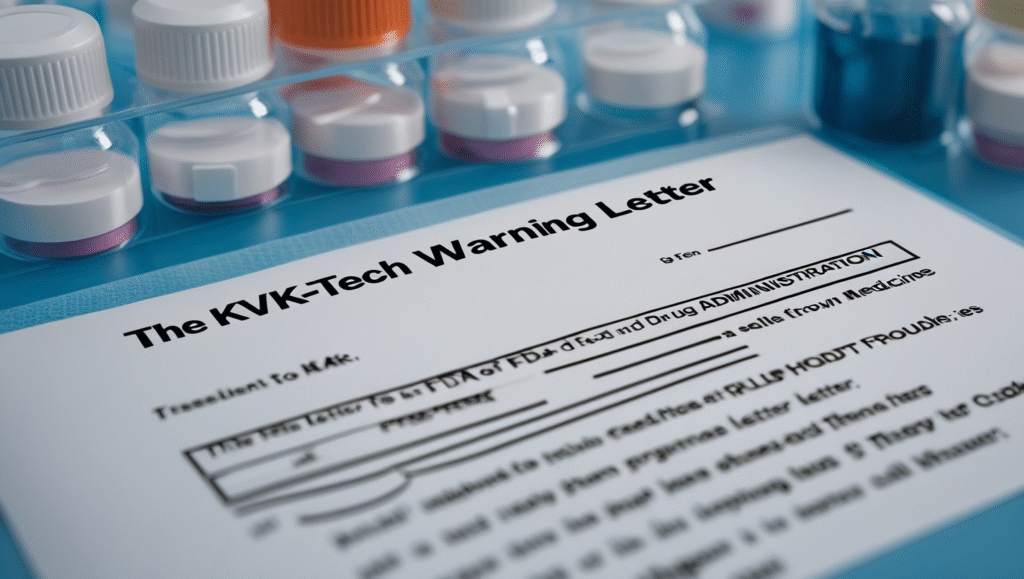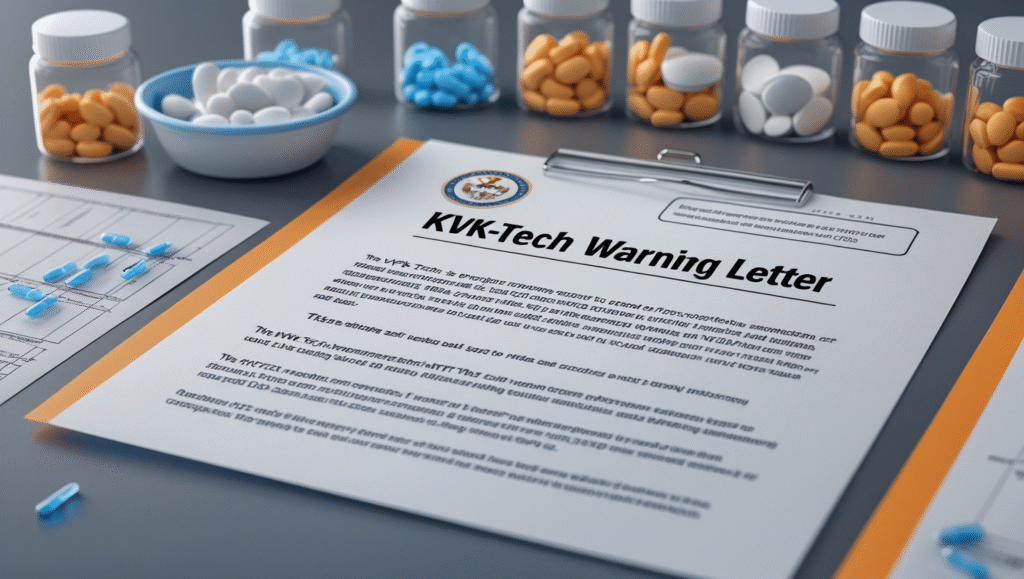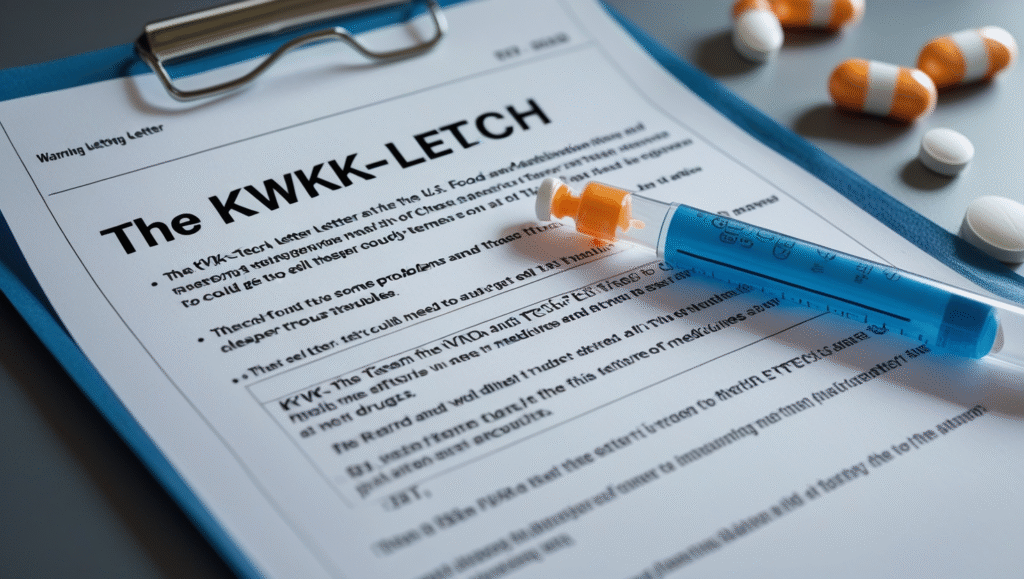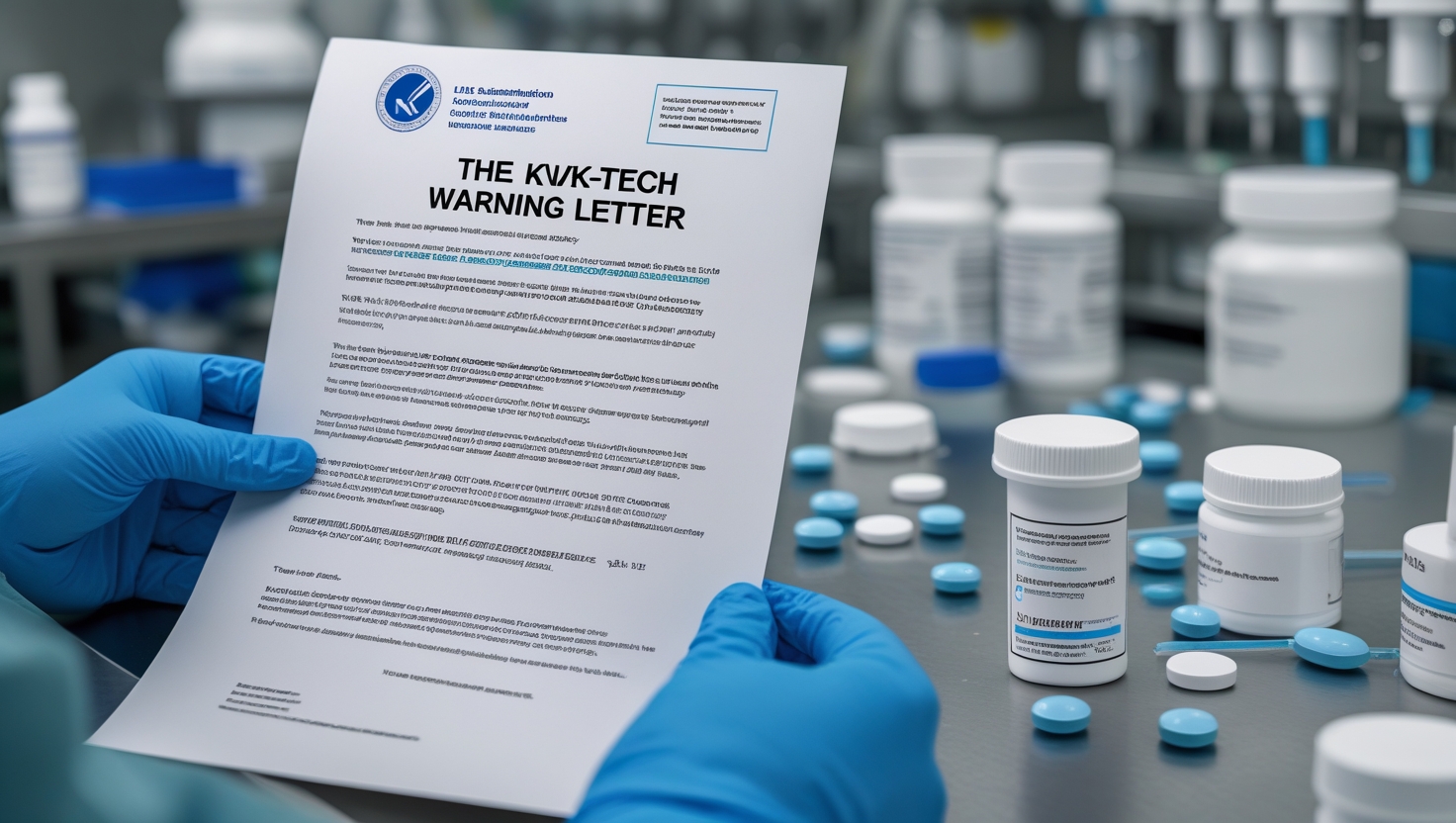The KVK-Tech warning letter is a big topic in the world of medicine. It’s a letter sent by the U.S. Food and Drug Administration (FDA) to KVK-Tech, a company that makes generic medicines—cheaper versions of well-known drugs. The FDA found some problems at KVK-Tech’s factory, and this letter tells them to fix those issues fast. If they don’t, they could get into serious trouble, like not being allowed to sell their medicines. This article explains the importance of the KVK-Tech warning letters and what the company needs to do next.
We’ll cover topics like what an FDA warning letter is, why following rules (called pharma compliance) matters, how medicines should be made safely (Good Manufacturing Practices or GMP), and other key ideas like data integrity, quality control, and inspections. Let’s dive in!
What is an FDA Warning Letter?
An FDA warning letter is like a teacher’s note to a student who broke the rules. The FDA sends it to companies that don’t follow the laws about making safe medicines. For KVK-Tech, the KVK-Tech warning letter came because the FDA spotted problems during a visit to their factory. The letter lists what’s wrong and tells KVK-Tech to fix it quickly.
Think of it like a yellow card in football. It’s a warning—mess up again, and the punishment worsens! If KVK-Tech ignores the warning letter, the FDA could stop them from selling their medicines or even fine them. It’s a big deal because safe medicines save lives.
Why is Pharma Compliance Important?
Pharma compliance means following all the rules that keep medicines safe and helpful. It’s like following the instructions when building a toy—if you don’t, it might break or not work. The KVK-Tech warning letter shows that KVK-Tech wasn’t following some of these rules, which could make its medicines risky.
Compliance covers how medicines are made, tested, and sold. It’s super important because people trust medicines to make them feel better, not worse. When the FDA sent the KVK-Tech warning letter, the company needed to get back on track to protect everyone using their products.
What are Good Manufacturing Practices (GMP)?
Good Manufacturing Practices, or GMP, are rules about how to make medicines correctly. They’re like a recipe for baking a cake—you need the proper steps and clean tools to make it tasty and safe. GMP says factories must be clean, workers must know their jobs, and medicines must be checked to ensure they’re good.
The KVK-Tech warning letter pointed out that KVK-Tech wasn’t following GMP properly. Maybe their factory wasn’t clean enough or didn’t test their medicines correctly. It is serious because bad GMP can lead to drugs that don’t work or could hurt people. KVK-Tech has to fix this to keep their medicines safe.

What are Data Integrity Issues?
Data integrity is about keeping true and correct records. Imagine doing homework and intentionally writing down the wrong answers—that’s a data integrity problem! In medicine-making, companies must stay honest notes about how they make and test their drugs. The KVK-Tech warning letter said there were issues with KVK-Tech’s records.
If the data isn’t correct, no one can trust that the medicines are safe or effective. Maybe KVK-Tech forgot to write something down or changed numbers it shouldn’t have. Fixing data integrity is a big part of ensuring that their medicines are safe for people to use.
What are Quality Control Violations?
Quality control is like checking your work before handing it in. For medicines, it means testing them to make sure they’re safe and work properly. The KVK-Tech warning letter found quality control violations, which means KVK-Tech didn’t check their medicines well enough.
It could mean they missed mistakes, like a pill with too much or too little ingredient. Quality control violations are dangerous because they can let bad medicines reach people. KVK-Tech needs to improve its checks to ensure that every medicine is perfect.
What are Pharmaceutical Regulations?
Pharmaceutical regulations are the laws companies must follow to make and sell medicines. They’re like school rules—they keep everything fair and safe. These rules cover how medicines are made, tested, and even labelled so people know what they’re taking.
The KVK-Tech warning letter showed that KVK-Tech broke some of these regulations. Maybe they didn’t follow the steps for making medicines or didn’t report problems. Following these rules is a must to keep medicines trustworthy and helpful for everyone.
What Happens During an FDA Inspection?
An FDA inspection is when FDA workers visit a factory to see if everything’s being done right. It’s like a surprise test at school—you have to be ready! They check the machines, talk to workers, and look at records. When the FDA inspected KVK-Tech, they found problems, which led to the KVK-Tech warning letter.
Inspections help catch mistakes before they become significant issues. This visit showed where KVK-Tech needs to improve. It’s a chance to fix things and ensure their medicines are safe for everyone.
What is Manufacturing Non-Compliance?
Manufacturing non-compliance means not making medicines according to the rules. It’s like building a toy plane without the instructions—it might not fly! The KVK-Tech warning letter mentioned manufacturing non-compliance, which could mean dirty machines, wrong ingredients, or skipped steps.
This is a problem because it can make medicines unsafe or useless. KVK-Tech has to follow the proper steps every time it makes a batch of medicine. Fixing this will help them return to making products they can rely on.

What is a Corrective Action Plan (CAPA)?
A Corrective Action Plan, or CAPA, is a list of steps to fix problems. It’s like a plan to tidy your room after making a mess—step by step, you make it right. After the KVK-Tech warning letter, KVK-Tech needs a CAPA to show the FDA how they’ll solve the issues.
They plan to clean their factory, train workers better, or fix their records. The FDA checks the CAPA to make sure it’s good enough. It’s KVK-Tech’s way of promising to do better.
What is Regulatory Scrutiny?
Regulatory scrutiny occurs when the FDA watches a company extra closely. After the KVK-Tech warning letter, KVK-Tech is under scrutiny because it needs to prove it’s fixing things. It’s like a teacher watching a student who got in trouble.
The FDA might visit more often or ask for more reports. This extra attention makes sure KVK-Tech follows the rules from now on. It’s all about keeping medicines safe for you and me.
How Did the KVK-Tech Warning Letter Happen?
The story of the KVK-Tech warning letter starts with an FDA inspection. KVK-Tech makes generic medicines in a factory, and the FDA wanted to check if they were doing it right. During the visit, they found messy records, poor-quality checks, and broken GMP rules. That’s when the FDA decided to send the KVK-Tech warning letter.
It wasn’t just one mistake—many problems added up. The letter told KVK-Tech exactly what was wrong and allowed them to fix it. It’s like a wake-up call to get serious about safety.
What Problems Were Found?
The KVK-Tech warning letter listed specific issues. For example, the FDA saw that KVK-Tech wasn’t keeping its factory clean enough, which breaks GMP rules. They also found data integrity problems—maybe some records were missing or wrong. Plus, there were quality control violations, meaning some medicines weren’t tested properly.
These problems could mean medicines aren’t as good as they should be. The FDA wrote the KVK-Tech warning letter to make sure KVK-Tech fixes every single one of these issues.
Why Does This Matter to Us?
The KVK-Tech warning letter isn’t just about one company—it’s about keeping all medicines safe. When you take a pill, you trust it to help you, not hurt you. Suppose companies like KVK-Tech don’t follow the rules, and that trust breaks. The FDA steps in with letters like this to protect us.
It also reminds other medicine makers to be careful. The KVK-Tech warning letter shows that no one can ignore the rules, no matter how big they are. It’s all about making sure we get medicines we can count on.
What is KVK-Tech Doing to Fix It?
After receiving the KVK-Tech warning letter, KVK-Tech is working hard to make things right. They’re cleaning up their factory to meet GMP standards, fixing their records to ensure data integrity, and training their workers to perform better quality checks.
They’re making a CAPA to show the FDA their plan. KVK-Tech knows this is their chance to prove they can make safe medicines again. The KVK-Tech warning letter pushed them to improve fast.

How Will the FDA Check on KVK-Tech?
The FDA won’t just trust KVK-Tech to fix everything—they’ll check! Because of the KVK-Tech warning letter, the company is under regulatory scrutiny. That means more inspections and close looks at their work. The FDA wants to see that every problem from the warning letter is gone.
If KVK-Tech does well, they can keep making medicines. If not, the FDA might take more decisive action. It’s like a test they have to pass to stay in the game.
What Can Other Companies Learn?
The KVK-Tech warning letter is a lesson for everyone making medicines. It shows that following rules like GMP, keeping good records, and checking quality isn’t optional—it’s a must. Other companies can look at KVK-Tech and make sure they don’t make the same mistakes.
It’s like watching a friend get in trouble and deciding to behave better yourself. The KVK-Tech warning letter helps the whole industry stay safe and strong.
A Safer Future for Medicines
The KVK-Tech warning letter might sound scary, but it’s about improving things. It’s the FDA’s way of keeping medicines safe for all of us. KVK-Tech has a chance to fix its problems and come back stronger. When it does, we’ll know its medicines are safe to use.
This story shows how important rules are in the world of medicine. The KVK-Tech warning letter is a step towards a future where every pill or syrup we take is just right.
References
- U.S. Food and Drug Administration. (n.d.). Warning Letters. Retrieved from https://www.fda.gov/inspections-compliance-enforcement-and-criminal-investigations/compliance-actions-and-activities/warning-letters
- U.S. Food and Drug Administration. (2018). Data Integrity and Compliance With Drug CGMP. Retrieved from https://www.fda.gov/regulatory-information/search-fda-guidance-documents/data-integrity-and-compliance-drug-cgmp-questions-and-answers
- U.S. Food and Drug Administration. (n.d.). Inspections and Compliance. Retrieved from https://www.fda.gov/inspections-compliance-enforcement-and-criminal-investigations
